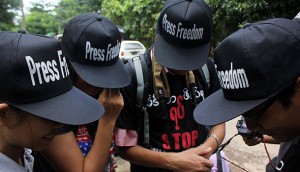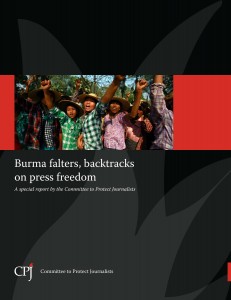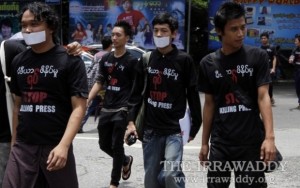Posts Tagged ‘Censorship’ (21 found)
Myanmar: Need for Permission Dropped from Assembly Law
The notorious provision in the Law on the Right to Peaceful Assembly and Peaceful Procession required permission to protest and is infamous in Myanmar as “Section 18”. ARTICLE 19 has tracked 132 cases where the government has arrested, prosecuted and imprisoned people for failing to get prior permission to protest. Many of those people were protesting against Section 18 itself […]
• • •Myanmar: Press Council Threatens Resignation as Lower House Fails to Amend Dire Press Bill
The Press Council has said that they will resign if the Printing and Publishing Enterprise Law bill, which ARTICLE 19 previously warned would restore prior censorship and full government control, is adopted.
The bill was passed by Myanmar’s lower house of parliament with only minimal changes. ARTICLE 19 urges the upper house and the president not to adopt the bill without further drastic changes […]
• • •Upper House of Parliament Must Reject the Printing and Publishing Enterprise Law
 On 4 July, the Lower House of Parliament approved the controversial Printing and Publishing Enterprise Law despite strong opposition and criticism by the interim Myanmar Press Council, local media and freedom of expression watchdogs.
On 4 July, the Lower House of Parliament approved the controversial Printing and Publishing Enterprise Law despite strong opposition and criticism by the interim Myanmar Press Council, local media and freedom of expression watchdogs.
The Ministry of Information introduced the draft law in Parliament last March, a week after the Press Council released its own draft Media Law. This came as a surprise as the Ministry’s draft was written in secrecy, presented to the Parliament before any consultation took place and happened despite an earlier agreement that the Press Council would be in charge of drafting the new media legislation.
As a reaction to this clear attempt by the Ministry to bar the Council’s legislation from being presented to the Parliament, local and international media loudly opposed the Printing and Publishing Enterprise Law. The Committee to Protect Journalists said, “If passed in its current form, the draft law will essentially replace Burma’s old censorship regime with a similarly repressive new one.” Article 19 called for the draft law to be withdrawn or rejected by the Parliament “as it would be a major step backwards for freedom of expression and freedom of the media, restoring prior censorship and full governmental control over the press” […]
• • •Burma Falters, Backtracks on Press Freedom
 The media landscape in Burma is more open than ever, as President Thein Sein releases imprisoned journalists and abolishes the former censorship regime. But many threats and obstacles to truly unfettered reporting remain, including restrictive laws held over from the previous military regime. The wider government’s commitment to a more open reporting environment is in doubt […]
The media landscape in Burma is more open than ever, as President Thein Sein releases imprisoned journalists and abolishes the former censorship regime. But many threats and obstacles to truly unfettered reporting remain, including restrictive laws held over from the previous military regime. The wider government’s commitment to a more open reporting environment is in doubt […]
Burma: Telecoms Risk Complicity in Surveillance, Censorship
International telecommunications companies risk being linked to human rights abuses if they enter the Burmese market before adequate protections are in place, Human Rights Watch said in a new report released today. Burma’s human rights reforms thus far have been inadequate, including in the Internet […]
• • •Advances and Challenges to Media Freedom in Burma
 World Press Freedom Day was held on 3 May, marking an eventful year for media freedom and freedom of expression in Burma. There have been both advances towards increased freedoms, but also serious challenges.
World Press Freedom Day was held on 3 May, marking an eventful year for media freedom and freedom of expression in Burma. There have been both advances towards increased freedoms, but also serious challenges.
Most notably, the government ended pre-publication censorship and the disbanded the censorship board, the Press Scrutiny and Registration Division (PSRD). Independent organizations such as the Myanmar Journalist Association, Myanmar Journalist Network and Myanmar Journalist Union, have been permitted to form in order to promote the rights and welfare of journalists, replacing the government affiliated Myanmar Writers and Journalists Association. The Ministry of Information and Communications granted permission for 16 privately owned journals to publish dailies for the first time in 50 years starting on 1 April, with an additional 10 journals granted permission at the end of April. Many exiled journalists have returned to Burma and foreign news agencies, such as Associated Press, NHK and Kyodo News, are opening offices in Rangoon.
Despite these positive steps, there remain many challenges to the freedom of expression of journalists and publications. One of the largest threats of repression is that the Printers and Publishers Registration Act (1962) and other restrictive laws remain on the books, providing legal grounds for the government to repress critical voices […]
Myanmar: Ministry’s Draft Press Bill Would Restore Prior Censorship and Full Government Control
A draft press bill put before parliament by the Minister of Information and Communications should be withdrawn or rejected when it has its first reading in June as it would be a major step backwards for freedom of expression and freedom of the media, restoring prior censorship and full governmental control over the press […]
• • •Human Rights Situation Deteriorated as Fighting Intensified in Kachin State
Burma’s human rights situation in January 2013 remained poor, in large part, due to the intensified fighting in Kachin State. In January 2013, the Burmese military admitted that it had launched an aerial assault against the strongholds of the KIO/KIA.
According to a member organization of the ND-Burma, there are over 25,000 refugees being sheltered in close proximity to the aerial attacks. Reports of civilian causalities have also been received […]
• • •Burma Continues to Repress Critical Voices
 According to Freedom House’s annual global survey on political rights and civil liberties released this week, Burma is still rated as “Not Free.” A “Not Free” country is one where basic political rights are absent, and basic civil liberties are widely and systematically denied.
According to Freedom House’s annual global survey on political rights and civil liberties released this week, Burma is still rated as “Not Free.” A “Not Free” country is one where basic political rights are absent, and basic civil liberties are widely and systematically denied.
This could come as a surprise after the reforms that President Thein Sein and his government have started implementing but as Freedom House explains freedoms of expression and association improved in the last two years “but they depend more on current government policy than on deep institutional changes.”
One of the noticeable areas of reform is freedom of information. Thein Sein released bloggers and journalists, ended pre-publication censorship, and authorized the publication of privately-owned dailies. Regrettably, as explained in a report released this week by Reporters Without Borders, “as things stand, the possibility of the reforms being perverted cannot be ruled out.” The Press Scrutiny and Registration Division is still in place and can suspend any weekly that publishes “forbidden” content, there is no law providing protection to media and journalists, the old oppressive laws remain unamended and privately owned weeklies have been facing legal proceedings […]
Burma Ends Pre-Publication Check, Not Censorship
 Prior submission of print media content that had been imposed for the last 48 years ended when the Press Scrutiny and Registration Board (PSRD) introduced its post-publication checks that came effective on 20 August. Journals and newspapers no longer need to submit their publication beforehand but afterward. However, the 1962 Printers and Publishers Registration Act and the 2004 Electronics Transaction Act that have been repeatedly used to jail journalists and activists are still in place. Journals have been suspended and could still be suspended at any time. Furthermore, journalists and reporters have to abide by the newly introduced 16-point ethical guidelines that prohibit them from criticizing the state.
Prior submission of print media content that had been imposed for the last 48 years ended when the Press Scrutiny and Registration Board (PSRD) introduced its post-publication checks that came effective on 20 August. Journals and newspapers no longer need to submit their publication beforehand but afterward. However, the 1962 Printers and Publishers Registration Act and the 2004 Electronics Transaction Act that have been repeatedly used to jail journalists and activists are still in place. Journals have been suspended and could still be suspended at any time. Furthermore, journalists and reporters have to abide by the newly introduced 16-point ethical guidelines that prohibit them from criticizing the state.
These repressive laws as well as the arbitrary regulations and code of conduct imposed on media and journalists remain a great threat to media freedom. The PSRD still monitors the content of publications and any newspaper or journal risks prosecution if any of their content breaks the guidelines. This has the very real potential of resulting in greater self-censorship […]
• • •








 All posts
All posts